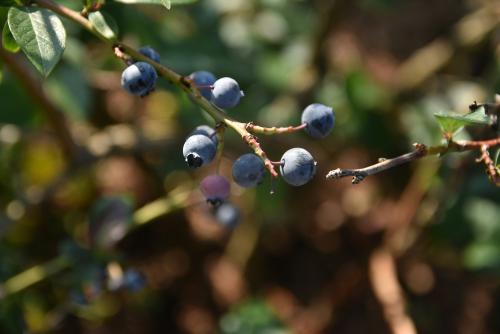
The choices we make about our food and drink are shaped by social norms, what is available and what is affordable. Scotland has a richly deserved international reputation for the quality of its extensive larder of nutritionally valuable animal and plant derived products that can be grown, harvested, produced and processed to provide a healthy and sustainable diet. However Scotland’s population has one of the poorest diet-related health records in the developed world. Driven by the ambition of becoming a Good Food Nation, SEFARI research explores the interplay between dietary health, affordability and sustainability, whilst also working to improve food safety.
Sector Contact

Case Studies

Consumer attitudes towards sustainable diets, The Rowett Institute, University of Aberdeen.
Are you a supporter, a convenience seeker or even a hedonist? Dr Patricia Norwood, health economist, explores the results of a new study that reveals the fragmented nature of public opinion towards the idea of a sustainable diet.
Scientists at The James Hutton Institute are spearheading cutting-edge research to support the UK’s National Action Plan for pesticide reduction, combining AI, big data, and biology to revolutionise Integrated Pest Management (IPM) in Scotland. From forecasting potato virus risks to advancing biological alternatives to conventional pesticides, their work helps farmers target pesticide use while safeguarding yields and the environment. Underpinned by RESAS funding, this science-driven approach is reshaping pest management, ensuring sustainable farming and future-proofing Scotland’s vital agricultural sector.
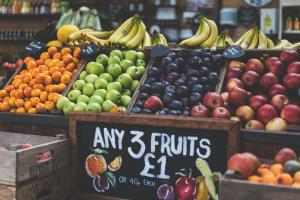
Fruit and vegetables are vital for a healthy diet providing essential vitamins, minerals, and fibre that also help lower the risk of noncommunicable diseases, such as heart conditions and types of cancer.
In this blog and using data since 2006, we provide an overview of how Scottish consumers are performing in comparison with the recommended intake of fruits and vegetables of 400 grams/capita/day (5-a-day). We also examine the origin of fruit and vegetables consumed in the context of Brexit and the changes in trade patterns.
Bunches of fruits (Tom Grünbauer on Unsplash)
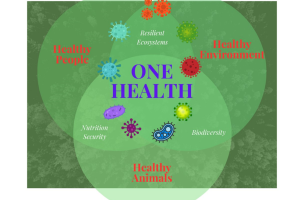
Antimicrobial resistance is an emerging threat to the health of animals and humans in Scotland and around the world. SEFARI scientists at the Rowett Institute have made some early, exciting findings that may prove invaluable in the global battle to hold back the spread of anti-microbial resistance. This blog post discusses the ongoing Scottish Government’s RESAS funded studies that are identifying environmental bacterial isolates that are showing promise for development as probiotics to inhibit antibiotic resistant bacteria across different ecosystems.
Illustration: Microbial ecosystems and One Health (Credit: authors)
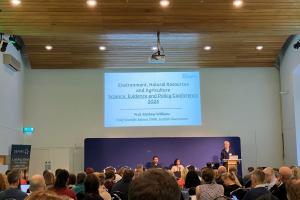
Climate Change Adaptation is one of the key items on the policy agenda in Scotland, and this was the main focus at this year’s ENRA Science, Evidence and Policy conference.
Organised by the Scottish Government’s Rural & Environmental Science and Analytical Services (RESAS) and held at Edinburgh’s Dynamic Earth, the conference brought together researchers and policymakers from across the rural and environment research and policy landscape in Scotland and showcased Scottish Government (RESAS) funded research evidence that is supporting climate change adaptation.
Title Image: Opening keynote by Prof Mathew Williams (Photo by Alöna Roitershtein)

Supported by SEFARI GAteway, the Royal Bank of Scotland, the RSA, and in particular the RSA Fellows Borders Network and the RSA Fellows Rural and Environmental Issues network Scotland and NFU Mutual, over 100 guests attended the Business breakfast from 8:30 until 10:30, in the Members Marquee, organised and welcomed by RSA fellow Mrs Ann Packard, FRSA, HonFRIAS.
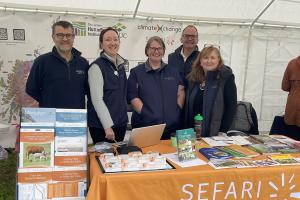
During this year’s GO Falkland gathering, in the foothills of the mighty East Lomond Hill on the beautiful Falkland estate, an enthusiastic collective of farmers, growers, artists, scientists and policymakers came together to discuss what Regenerative Farming, Forestry, Land Use and Food means for them. During the event, we shared experiences and insight to collaboratively work towards the shared goals of the sustainable future.
SEFARI and SEFARI Gateway were there to contribute to and support these conversations over the two days. Find out more in this blog.
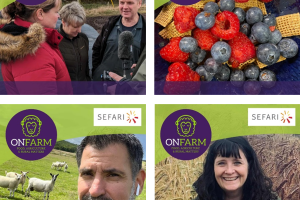
What do hemp, barley, antimicrobial resistance and soft fruits have in common? They are the episode themes for a series of podcasts that SEFARI and SEFARI Gateway has created in partnership with OnFARM. So, if you’re a farmer, grower, food producer or simply interested in the science behind what we eat and where it comes from, then this is the 4-part series for you. Enjoy!

Promoting more healthful food practices is a central goal for policy makers and health professionals in many high-income countries, but it isn’t easy to achieve.
This blog adds to an earlier SEFARI blog which presented findings from a study of eating patterns in Scotland. This update includes the publication of two articles in peer-reviewed journals with the first examining when eating habits may be revised in light of dietary guidelines across the lifecourse and the other exploring how some people are able to construct and maintain healthy eating habits whilst others may struggle. In addition, we report the appointment of a RESAS funded PhD researcher to develop the research further through a study of healthful and environmentally sustainable eating patterns across the lifecourse.
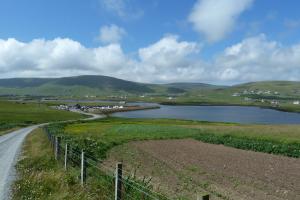
Here at SEFARI, we strive to make the world more sustainable, greener, and equal and we’ve got an amazing team of people who make this possible. As its International Women’s Day, we’ve decided to highlight some of the work done by our female researchers and/or our research that is addressing key issues affecting women.
From supporting rural women in the Arctic in making low carbon transitions, to closing the gender pay gaps, to sector-leading research - we cover it all in this blog post.
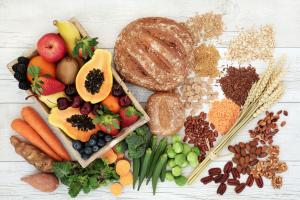
In Scotland, the prevalence of those overweight and obese remains high. There are many lifestyle factors that contribute to obesity, but, in general a major contributor is the diet is too high in calories, and contains too much processed food, fats, sugars, and salt and too little fibre that is found in wholegrains and fruit and vegetables.
In this blog, we outline our recent research on consumer attitudes and behaviours related to dietary fibre intake. The results enable us to better identify the priorities that could elicit change. The main challenge is to educate consumers that fibre is only found in foods originating from plants.
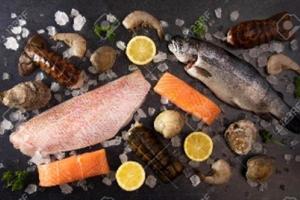
Many of us want to eat a healthier and more sustainable diet and eating more fish is often one option recommended.
However, SEFARI research has identified that, across Europe, dietary recommendations for fish consumption do not necessarily match national seafood supplies.
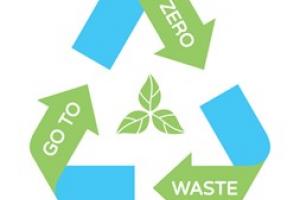
With growing pressures on food resources, agricultural inputs (e.g., energy, soil, water), production costs and the environment, many of us are looking at how we can reduce food wastage whilst still ensuring we get adequate nutrition.
In this blog. Madalina and Marietta - research fellows at the Rowett Institute, discuss work they’ve been doing to establish if broad bean hulls could be reused as food/food ingredients, in a bid to deliver circular nutrition (reusing food waste and providing needed dietary nutrients) as a zero-waste solution. It is hoped such approaches could contribute to a greener economy and a balanced diet simultaneously.
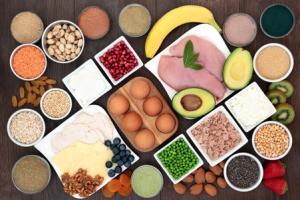
In 2019, a Scottish Health Survey report, commissioned by the Scottish Government, highlighted that two in three adults are classified as overweight or obese (with a body mass index, BMI >25), the highest prevalence since 2003. This is a real concern because obesity, is linked to a range of serious health conditions including diabetes, cardiovascular disease (CVD), hypertension and certain cancers.
In this blog, Professor Alexandra Johnstone outlines recent SEFARI research that has been examining plant-based diets and discusses how, in moving towards a more healthy and sustainable diet, we also need to ensure health inequalities aren’t widened.

In September, colleagues from the Moredun Research Institute, SEFARI Gateway, the Food and Drink Federation Scotland (FDF Scotland), Royal Highland Educational Trust (RHET) and Quality Meat Scotland (QMS) outlined a wealth of educational resources that cover the sustainability of key resources such as food, water, and energy. A key priority for the younger generation especially with COP26 on the horizon, and on our doorstep!
By joining forces at a continuing professional development (CPD) event, organised by the Scottish Schools Education Resources Centre (SSERC), our session was designed to support teachers with the delivery of National 4, 5 and Higher Environmental Science. The session ended by moving outside of the classroom to see the new mobile laboratory and education bus, created as part of Moredun’s centenary, which is being used to visit schools and engage children with different science topics. Seeing the bus gave us the opportunity to extend discussions in a more relaxed environment out in the autumn sunshine.

Cardiovascular disease (CVD) is the leading cause of death globally. In 2019 it was estimated that 17.9 million people died from CVD, representing 32% of all deaths globally. Poor diet can be a contributor to non-communicable diseases such as CVD; particularly diets that are rich in sugar, salt and unhealthy fats.
In this blog, you can meet the team of SEFARI researchers trying to aid our understanding of the links between atherosclerosis (where arteries become clogged with fatty substances) and diet and, what they’ve discovered so far.
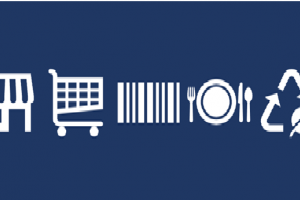
An emergent model of food redistribution, social supermarkets (SSMs), hold considerable potential for facilitating social development in deprived areas while diverting food waste. SSMs take high quality surplus food, not sellable in the mainstream market, and provide it to low-income consumers for greatly discounted prices in a more dignified shopping experience.
In this blog, Aiden Berri and Luiza Toma discuss how their research has found consumers’ intentions to use a SSM are influenced by a variety of factors which combine their food insecurity and food waste attitudes.
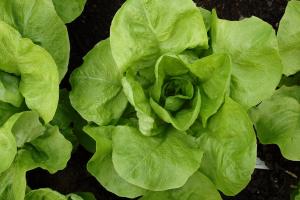
Zoonotic pathogens are microorganisms transmitted by animals, which cause disease and illness in humans. Many of them are foodborne and are commonly associated with farmed animals, or less frequently with wildlife. However, some pathogens are also transmitted into the food-chain indirectly from animals onto plants, via faecal contamination of water used for irrigation or via the soil where the plants grow. If the plants are destined for consumption, e.g., fruit and vegetable crops that are normally consumed raw or minimally processed, this can become a foodborne hazard.
Surprisingly though, there is still a misconception that plants play only a minor role in zoonoses survival and spread, even though fresh-produce accounts for similar numbers of foodborne outbreaks as meat or dairy. At SEFARI our researchers contribute to work in this area and are part of only a relatively small number of researchers in the UK & Ireland who do. In this blog, Dr Nicola Holden discusses how SEFARI research fits into this complex issue, outlines the key risk factors (illustrated with examples) and identifies what questions still need to be addressed.
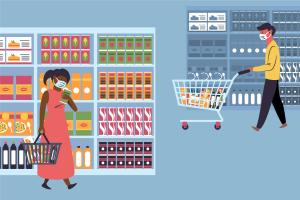
Since March 2020, attempts to control the spread of COVID-19 have led to substantial and far-reaching changes to everyday life, with social restrictions of varying severity imposed, relaxed, and reimposed over the intervening 12 months. With habitual dietary intake largely dependent on environmental cues, significant changes in our typical lifestyles and everyday surroundings might be expected to have consequences for our diets and food habits.
In an earlier blog, we explained how we would leverage an existing (ongoing) study on dietary habits to examine how our food habits have changed over the course of the pandemic. In this blog, we present some of our initial data and outline what we have discovered so far.

The past year has been, and 2021 will undoubtedly remain, challenging for us all. At Gateway we are focussing our efforts on continuing to support the COVID-19 recovery response while maintaining momentum for knowledge exchange partnership working across environment, land, agriculture, food and rural community priorities.
In particular, we are building upon opportunities to accelerate action towards a green recovery, climate and biodiversity action and just transition for net zero emissions. Gateway is supporting these and other key agendas such as health and wellbeing, by providing extensive access to Scottish Government strategic research and expertise through our funded projects which we are also increasingly interlinking projects to maximise the value of evidence and to further enhance stakeholder linkages.
This update follows on from our previous update in June 2020 and outlines our more recent funded projects and activity.
Pagination
Blog

If there is one thing that we can all agree on when it comes to sustainable diets it is…well, nothing at all.
That is one of the most striking – and useful – findings of our recent research into what is stopping us changing what we eat to help tackle climate change.

Over the years successive UK governments have implemented various policies to encourage fruit and vegetable consumption.